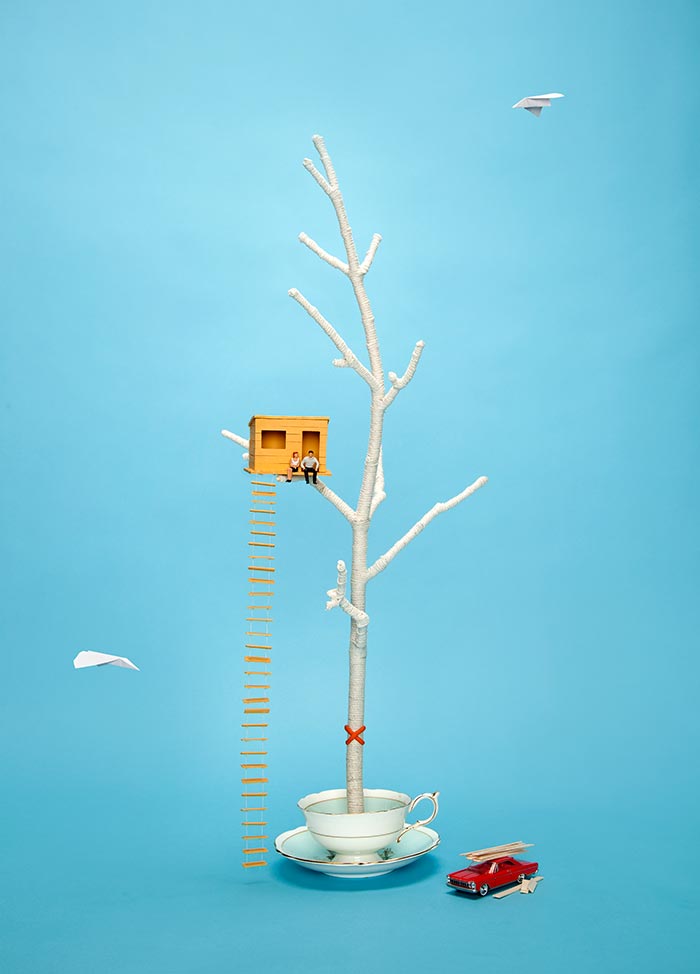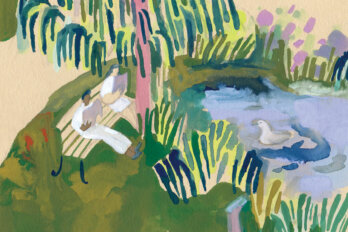Manfred’s wife, Elizabeth, pets the elm tree in their front yard. Last month, city workers painted a giant X on its trunk.
“Poor tree. It knows what orange spray paint means.” Elizabeth flips open her phone and calls the city. “When will you be euthanizing my elm? ”
Hedwig, their Polish neighbour, sits on her porch sipping pickle juice from a martini glass. “Don’t be nostalgia,” she yells. “I’m ready for change.”
She taps her oversized sun visor and points to the bald spot on her lawn where her tree used to stand.
“I hate to admit she has a point,” Manfred says. “It is just a tree.”
Manfred looks at the elm. He likes the tree as much as one can possibly like a tree, though he has always thought it was too close to the house and worried it might crash through the roof in a storm. He also hates all the raking in autumn and the way the sap shellacs the windows and makes bugs stick to it. He thinks some shrubs would be nice and doesn’t exactly mind the idea of driving home one day to find a pile of sawdust.
“Sometime between May and September is not a date,” Elizabeth shouts into her phone, then snaps it shut. “Why can’t they just tell me when? ”
“They work for the city. They can’t commit.”
She resumes petting the elm and offers to bring it tea. “You’ll feel so much better.”
Manfred would feel better if they were in the backyard, doing all of this tree comforting behind a fence. Lately, she wants to make everyone and everything a cup of Earl Grey. All of their houseplants are dying. The goldfish is already dead; Elizabeth flushed it, along with a tea bag.
“Why can’t you see it’s worth trying to save her? ” Elizabeth leans against the tree. Shadows from the leaves make strange shapes dance across her face.
“Because we can just plant a new one. I’ve always liked boxwoods, and we’d be less likely to wake up with them lying across our bed.”
Manfred goes inside. Elizabeth will come in only when she is certain no chainsaw-wielding arborist from the city is going to charge down the street, strapped into one of those giant buckets.
Since the tree got sick, Manfred does like knowing where his wife will be: camped under the elm, hugging the elm. Throughout their marriage, Elizabeth has been known to wander.
Safaris.
This is what she calls it when she disappears. She either returns on her own, or Manfred gets a phone call and has to pick her up at the local Gymboree or the paintball field where she has been picketing. Make love not war.
At first, her safaris filled Manfred with a sense of urgency. His wife was missing! Later, she would be found in her underwear in a wading pool two blocks away. Sometimes he would try to wait it out; sometimes he would plaster the neighbourhood with missing posters.
“That tabby cat of yours lost again? ” Hedwig would ask as he stapled a picture of Elizabeth’s head to her tree.
The police rarely helped, because Elizabeth always left a note.
On safari! Back in a jiffy.
Once, when she didn’t come back in a jiffy, Manfred became a suspect. He rode around in a police cruiser until they found her outside a community centre, running through sprinklers in the moonlight.

“Sorry, man,” the officer said when he dropped them off at home. “That’s got to suck.”
“You have no idea.”
When Elizabeth got out of the car, she was still soaking wet and left an outline of herself on the seat. She stood there on the curb, dripping. By then she was cold, the edges of her lips turning blue. Neighbours parted their curtains. When he got out of the car, Manfred wrapped a towel around her, which she removed and made into a turban.
“We lose 90 percent of our heat through our heads,” she said.
Manfred gently guided her back inside the house and began to wonder what it would be like to be married to someone else.
From the nightstand, Elizabeth grabs her elephant bong, gets it smouldering with an expert flick of her lighter. By the glow of the flame, her self-inflicted haircut doesn’t look as bad.
“It’s the shattered look,” she said when she came out of the bathroom with fistfuls of hair.
“It’s really working,” Manfred replied. He didn’t know hair could look like that.
She inhales deeply, leans back, and holds her breath until she sputters smoke.
“Want a hoot? ”
Manfred nods, and they pass the elephant between them.
When her doctor wouldn’t give her a marijuana prescription, she went straight to the pot store, grabbed the bong and said, “I’ve always wanted to smoke out of a trunk.”
The clerk nodded and told her where she could score her first quarter.
When Elizabeth finally stops talking about Dutch elm disease and falls asleep, Manfred watches her eyeballs flutter beneath her lids. He is happy sleep comes easily tonight. Last week at her doctor’s appointment, she complained of insomnia, how she bought things when she couldn’t sleep: a leopard print Snuggie and the Slap Chop. She brought these to the appointment and laid them on the examination table.
Manfred wanted the doctor to give her drugs. It was a very simple solution provided by doctors everywhere all the time. But the doctor said, “You should enjoy life while you can.”
Manfred realizes now that he should have come to his wife’s rescue. But at that moment, all he could think about was ordering a new spouse off a late-night infomercial—one with parts in working order and under warranty, one more convenient, one who didn’t need to be implanted with a GPS tracking device. All he could think about was getting some sleep. He couldn’t stand another night of hearing about four easy payments.
“Some barbiturates, please,” he said.
He tries not to think of that now, of the way he acted or did not act. He pulls a blanket up to Elizabeth’s chin, bends down, and feels her exhale gently in his ear. The smell of her breath always reminds him of sweet corn. He hovers above her and nibbles the air, tries to think of her good qualities.
Manfred met Elizabeth when she interviewed for a position at his fortune cookie company. She was a greeting card writer looking to branch out.
“I thought you’d be Asian,” she said when she sat down. Her hair was a tangle, and she had a few disposable chopsticks stuck in it.
“I’m Swedish,” he said, trying to sound offended.
After a long pause, she pulled out her portfolio of get well soon, sympathy, and wedding cards.
You’re sick. That sucks. © Elizabeth
I’m sooooo sorry. © Elizabeth
Ah, wedding bells. Ring-a-ding-ding. © Elizabeth
“Why do you want the position? ” Manfred asked as he leafed through her work.
“I like short sentences.”
“Sounds reasonable.”
“So, you’re not even a little bit Asian? ” she asked. “I wore these chopsticks to make a good impression.” She pointed to the ones impaling her bun.
“Nope, still Swedish.”
She wanted to see how fortune cookies were made, so he toured her around the plant until she wandered off and got lost among the twirling vats. He realizes now he should have taken this as a sign. But there was a certain excitement in following her, in finding her. He rarely came onto the factory floor. She made everything he did seem interesting.
That day, when Manfred found her again, she was holding a handful of broken cookies and had a stack of fortunes pinched between her fingers.
“These are very pedestrian,” she said. “Trust me. You need me.”
Manfred wakes in the morning, and Elizabeth is gone. He fights that familiar feeling of relief and dread. Before he looks for her, he thinks about lying diagonally in the bed, maybe splaying out like a starfish. He lifts the covers and looks at the line Elizabeth duct-tapes down the middle every time they change the sheets.
She said, “Even people who live together need to be invited to the other side.”
Manfred liked this idea. Even when she was on safari, he didn’t cross it. Now he stretches his foot over to her side, very slowly. The fabric is cold against his foot and calf. He lets only his big toe touch the edge before he pulls it back to his side.
When Manfred goes out to the front yard, Elizabeth is holding a one-woman protest. She bobs her sign up and down—Save the Elm!—and marches around the tree, occasionally switching directions to unwind. Neighbours walk by and nod or smile or grip their children’s hands a little tighter. Elizabeth has made them that couple.
“I’ve called an arborist,” Elizabeth says. “I want a second opinion.” She has dark circles under her eyes. A dozen cankerworms have dropped from the tree and are humping their way across the top of her head.
Manfred waits with her. When the arborist pulls up and gets out of his truck, Elizabeth says, “This guy better have excellent tree-side manners.” She offers him tea, but he shakes his head.
“She’s a beauty, isn’t she? ” The arborist touches the bark and gently peels back a few layers like they are gauze bandages. “These are feeding galleries.” He points to marks on the tree that look like woodcarvings in the shape of starbursts.
“Can it be cured? ” Elizabeth asks.
“I’d bet my left nut it’s too late for this one.” He tells her treatments will prolong life, not cure anything. “These things rot from the inside out. Before you know it, they’re hollow.”
Elizabeth pets the elm. “You’re sick. That sucks.”
“Do you want to go ahead with treatments? ” the arborist asks.
Elizabeth nods. He grabs a giant needle from his kit. She looks away while he injects deep into the trunk.
“Enjoy her while she’s still standing.” The arborist leaves.
Elizabeth turns to Manfred, clings to her sign. “I wish we had built our house around the tree. You see that sometimes, a tree in the living room. I might have noticed it getting sick.”
Even though she is right in front of Manfred, she looks like a missing person.
Inside, Elizabeth starts putting on her work clothes. Manfred asks if she’d like to stay home instead. She is down to one day a week anyway and naps under her desk for most of it.
“I need to be productive. People depend on me to tell them how their futures will turn out.”
He wants her to stay home and rest, but mostly he needs her to stay home because she is terrible for business. Her fortunes have become increasingly pessimistic, and suppliers are complaining.
A dark shadow moves with you.
The time for romance has passed.
Somewhere, a long, happy life probably awaits you.
This is not the kind of news people want to get after eating their ginger beef noodles and won ton soup. But Elizabeth confessed it makes her feel better to make other people worry. Just a little.
“Don’t you want to relax and read some books? We can stop paying Hedwig to watch the elm. I really hate how she stuffs my money into her bra.”
“She needs the money. Besides, a pile of books will just remind me of all the stories I’ll never get to.”
“We all have stories we won’t get to.” This strikes Manfred as the wrong thing to say. He wonders if he will do better with his next wife.
Elizabeth lies down and agrees to stay home. She asks Manfred to install a baby monitor by the elm so she will be able to hear chainsaws if they come while she is sleeping.
“They can’t just sneak up on me like that,” Elizabeth says. “I need fair warning.”
Manfred buys and installs the monitor. “Anything else? ” He holds his wife’s hand.
Elizabeth puts the monitor to her ear. “I would really love a tree house.”
On his way to work, Manfred mentally sketches in more of his new wife: Samantha. She likes the same radio stations he does. There is no zipping back and forth between the oldies and New Age flutes. She likes to travel and, unlike Elizabeth, does not need to wear a harness and leash in a crowd.
Samantha is kind. She has never had career ambitions. To pass time, she volunteers at an animal rescue shelter and specializes in the care of lop-eared bunnies previously used for research. When she is not caring directly for the animals, she canvases local grocery stores for donations of lettuce and carrots. Manfred likes Samantha’s legs. Even in her Humane Society uniform, he can tell they are sexy.
Samantha has a small scar below her left knee. She got it when she was twelve, during her professional skateboarder phase, which, incidentally, only lasted one day. The injury knocked her out of her chosen career.
Samantha comes from a normal family. When her mother (Eleanor/please call me Mom) carves the turkey at Christmas, she does not talk about her mastectomy as she slices off the bird’s breast. As the meat falls into a neat pile, she does not talk about skin biopsies. Eleanor does not wear low-cut tops that show a swoosh of scar tissue, still howling years later. In Samantha’s family, they don’t even eat meat.
At the factory, Manfred goes into Elizabeth’s office. He looks at the fort under her desk where she often works by flashlight. He slowly removes the unfinished fortunes tacked to a corkboard.
You will never be…
You will not have…
You will not meet…
Manfred puts them in an envelope. He looks at the other things in her fort: a blanket, pillows, slippers. She even has a curtain for complete darkness. Manfred pulls it shut. Glow-in-the-dark constellations and a sliver of moon light up the underside of her desk. She has her own universe here.
Manfred stays under the desk until he feels it’s a respectable time for a boss to leave. When he pulls into the driveway, he finds Elizabeth—in her wedding dress—picking a bouquet of flowers from Hedwig’s garden.
“Let’s renew our vows,” she says.
“No need.” Manfred has an acute awareness of the neighbour’s curtains parting. “Let’s get you inside.”
Elizabeth sits down with a daisy and starts pulling off the petals. “He loves me. He loves me not. He loves me.”
“You can’t keep doing things like this,” Manfred says.
“He loves me not, not, not, not, not.” She throws the bouquet over her shoulder. The petals flail, then scatter on the ground.
Hedwig comes out in her robe. She touches Elizabeth on the shoulder and guides her toward a different patch of daisies. Quietly, to Manfred, Hedwig says, “In case you didn’t know, shit dip, your wife is dying.”
When Elizabeth has revived her bouquet, she walks toward Manfred, holding up her dress with her free hand. He is struck by all of the fabric around her—so much empty space between her and the dress. When they first got married, there was so much of her. She bulged and occupied space. Her breasts spilled out of the gown like she had a spare set.
Manfred collects her and carries her inside. He remembers how she carried him over the threshold on their wedding night. As he lays her down on the bed, she feels like a pile of bones. Her bouquet falls apart on her chest.
Manfred grabs Elizabeth’s hand and says, “I do.”
She quietly recites her old vows. “I promise to make you falafels from scratch every fourth Saturday morning. I will never leave the cap off the toothpaste or my towel in the sink. I will have an adventure every day and always invite you.”
When it opens the next morning, Manfred goes straight to Home Depot.
It seems many people go to Home Depot on Saturday mornings. Manfred has never been. He has never been keen to fix things.
He wanders up and down the aisles. An older man wearing an apron asks Manfred if he has found all he is looking for. Manfred asks where he can find two-by-fours and rustproof nails. The man shows him. Manfred can tell he likes his job but hates his apron. He tries to make it look manlier by sticking a tape measure and a utility knife in its pouches.
Manfred shows him the tree house manual. The man tells him which coloured lines on the floor he needs to follow. Manfred rolls along, and the things he needs pile up in his cart.
When Manfred gets home, city workers are re-marking Elizabeth’s tree. Hedwig is there, arguing with them. Finally, she spits and pulls a wad of money from her bra. The workers leave, counting the loot between them.
Hedwig says, “You have until the end of September, shit dip. Don’t blow it.”
He sees she has turned off the baby monitor. When he gets inside, Elizabeth is asleep, still in her filthy wedding dress.
While Manfred takes his supplies out of the car, Hedwig sends her son, Bolesław, over.
“I quit college and am boring. Can I help? ”
Manfred, with no previous tree house making skills, accepts. Hedwig sits down in her chair, swings her leg over an armrest, and says, “I’m foreman.”
Together, Bolesław and Manfred make a rope ladder and swing it over the tree. Manfred climbs up. They make a hoist, and Bolesław sends planks up, late into the evening. From the ground, Hedwig shouts instructions that surprisingly make sense. When they are done making a semi-level platform, Manfred holds the hammer over his head.
When Elizabeth wakes, she wanders outside looking disoriented, complaining she is cold. “Have you seen my roach clip? ” she calls out to a woman walking her Yorkie.
“Look,” Manfred says, “for you.” He is standing in the tree, feeling a bit like Tarzan.
Bolesław helps Elizabeth up the ladder. She sits in her new home and pets the tree’s upper limbs. “All better,” she says. “All better.”
Even as a child, Manfred never wanted a tree house. Now that he is in one, he sees the appeal and wishes they had done this long ago. He holds a fallen leaf to Elizabeth’s face. “Green is your colour.”
The next day, Manfred and Bolesław build four straight-ish walls while Elizabeth sits on the front steps and writes slightly more optimistic fortunes.
Something of value may be returned this week.
Almost everything you do, you do with grace.
When they’re done, they move some things into the tree, including Elizabeth’s chaise—a beautiful piece of furniture that never gets used. Bolesław makes her a dumb waiter out of a cooler and a rope. He tells her he will make her tea any time. “Day and night. Just ring my bell.”
Elizabeth sits down, folds up her fortunes like little airplanes, and dive-bombs everyone who walks by.
“It’s your almost-lucky day,” she says when they look up.
Throughout the summer, Elizabeth and Manfred slowly move into the tree house. They plant impatiens and put them in the windowsill. They watch them grow. They string up white lights and turn them on every evening. At night, they press close on the chaise to keep each other warm. There is no duct tape.
Manfred starts working from their tree home. Cellphone reception is great. They take in a pet squirrel. They make the community newspaper: “Lovebirds Nest in Dying Elm.”
When their neighbours walk by, Elizabeth waves them up the ladder. They never had company in their house—the one below with the broken windows and a small forest growing in the eaves. But here the people come, climbing up a rope ladder to sit in their tree house.
Elizabeth smokes less pot and seems to get high off the neighbourhood gossip: Richard and Carol are both having an affair with their cleaning lady; the Watsons got a fine for not mowing their lawn; the Tanners’ daughter ran away a few weeks ago (they think she is a drug addict and prostitute); Mr. Fergus is going blind but insists it makes him a better driver.
When Elizabeth has had enough, she writes each guest a special fortune and sends them on their way.
Nothing wrong with sharing.
Long grass is underrated.
Your child wants to be found.
As autumn approaches, the days grow shorter. The leaves change colour, and the peach of Elizabeth’s face drains along with them. The air holds a faint smell of decay, and there is something damp and rotting about her scent, too. At night, Manfred does his best to ignore the elm bark beetles that burrow into his pyjamas and hair.
“These are the last stages,” the arborist tells them as he sinks in the final needle. “We should stop treatment now.”
Elizabeth seems ready.
Some nights, Manfred can’t ignore the beetles. He flicks them off, but they multiply. “I have to go in. Please come with me.”
Elizabeth shakes her head. “I have to get used to this. I don’t want to be cremated.”
By the faint light of the street lamp, he watches beetles crawl across her face. “I wish I had gone on more safaris with you.”
In the beginning she did invite him, and he went, following her through a farmer’s field to pet a newborn goat, driving her far away from the city lights so they could see a comet that wouldn’t be visible again in their lifetime. He thought they were making remember when moments, doing things they could look back on when their lives had become so normal they were unrecognizable. But Elizabeth had no intention of stopping. She went on and would go on without him.
When Manfred does make it through the night outside, they wake covered in a blanket of leaves. He brushes them off. Elizabeth sweeps them away, then sits on the floor looking up, terrified of the next one to fall. When she is not sweeping, she sleeps or reads a few sentences, then puts her book down.
“I guess my brain is as full as it’s going to get. I’ll never know the history of the British Empire, and I’m never going to finish Ulysses.”
“No one finishes Ulysses, and if they say they have they’re lying.”
She says she is cold. He rolls her up in a duvet.
“I want to be closer to the sun,” she says.
It is approaching late September. Manfred looks at the tree and thinks there is still time to build a second storey.
When Manfred returns to Home Depot, his friend in the apron is not there to guide him. There are no people in the aisles. He buys more cedar boards and a manual on how to build a staircase. He looks at it and hopes Hedwig will loan him Bolesław again.
On the way back, before Manfred is on his street, he hears the angry buzz of a chainsaw. He drives up to find Elizabeth chewing away at the tree while city workers smoke cigarettes and guide her. The saw eats into the trunk, then kicks back. She keeps gouging.
“Whack, whack,” she yells as Manfred approaches. She holds the saw above her head.
She takes a few more runs at the tree until the saw gets stuck and Manfred pulls her away. For a small woman, she has done a lot of damage. All around the base of the tree, there are big chunks missing. The elm groans, then leans slightly.
“I decide when it’s over,” she says.
Manfred tells her about the supplies strapped to the roof of their car. “There’s still time.”
Leaves swirl at their feet. The tree cracks again.
“Timber!” Hedwig yells.
They move out of the way and watch the tree rush toward the pavement and a row of parked cars. The crash shakes the neighbourhood, breaks glass, crushes metal, sets off alarms.
Manfred hears Elizabeth exhale, then feels her hand slip away. A small crowd gathers around the tree. Among the people and broken limbs, he loses sight of her.
“Such a shame nothing could be done,” they say. “She really added character to the neighbourhood.”
Manfred does not look for her this time. He stands and lets the first snow of the year fall around him. It is still warm enough that it melts as soon as it hits the pavement. His car is untouched, the lumber and supplies still strapped to the roof. He keeps looking at it until the light fades and all he can see is an outline of a staircase he will never build.
The Walrus thanks the Writers’ Trust of Canada for its financial support of this story.
This appeared in the July/August 2013 issue.





